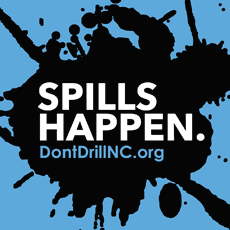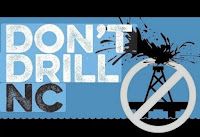North Carolina’s 300-mile coast is an environmental and economic powerhouse — supporting vibrant tourism, commercial fishing, and unique marine ecosystems. Yet federal plans to expand offshore oil and gas drilling put all of that at risk.What’s Happening:
The Bureau of Ocean Energy Management (BOEM) is developing the 2024-2029 National Outer Continental Shelf Oil and Gas Leasing Program, which outlines proposed offshore lease sales over five years. They are currently seeking public input to help shape the final version of the program. If North Carolina is included in their plan, this could allow dangerous drilling and seismic testing in our waters — threatening wildlife, tourism, fisheries, and coastal communities.
How You Can Help: BOEM is taking public comments through June 16. Speak out today to protect our coast! You can comment:
Online: Go here, and click “Comment” to write your message,
or by mail: in an envelope labeled “Comments for the 11th National OCS Oil and Gas Leasing Program” and send to: Ms. Kelly Hammerle, BOEM 45600 Woodland Road, Sterling, VA 20166-9216

Key Messages & Supporting Facts:
A Thriving Yet Fragile Coastal Economy
NC’s coastal tourism industry generated over $6.8 billion in 2023, supporting over 30,000 jobs. Commercial and recreational fishing added $2.5 billion in 2022 and tens of thousands of jobs. Offshore drilling could permanently damage this economy through spills and industrialization.
Offshore Drilling is Devastating to Marine Life
Seismic blasting used to locate oil deposits can harm or kill marine life — including fish, zooplankton (the base of the food web), and up to 138,000 marine mammals, per BOEM’s own data. Drilling infrastructure threatens nesting sea turtles, migrating whales, and vital fish nurseries like the Pamlico/Albemarle Estuary — the second-largest estuarine system in the continental U.S.
Critical Habitat is at Stake
The coast is now part of protected habitat for the endangered North Atlantic right whale — as of 2024, fewer than 370 remained worldwide. Drilling could also impact the biologically rich waters off Cape Hatteras, where the Gulf Stream and Labrador Current meet.
Spills are Inevitable — and Expensive
“When you drill, you spill.” The 2010 Deepwater Horizon disaster cost $65 billion in damages — more than NC’s annual state budget. Even small, routine spills and toxic discharge harm ecosystems and erode public trust in coastal safety.
Minimal Energy, Massive Risk
The Atlantic holds only 0.5% of the world’s oil — and would supply just 36 days of U.S. demand. Drilling would not lower gas prices meaningfully — the EIA estimates just a 3-cent decrease by 2030 if all offshore areas are opened.
Coastal Communities Overwhelmingly Oppose Drilling
Over 200 local governments on the East Coast, including 46 in NC, have formally opposed offshore drilling. Ports like Wilmington, Morehead City, and even the U.S. military and NASA have raised concerns.
Your Voice Matters!
This is a forever decision — once drilling starts, it will continue for decades. Speak up now to protect North Carolina’s waters, wildlife, and way of life.
Submit your comment by June 16 and tell BOEM:
No offshore drilling. No seismic blasting. Not here. Not now. Not ever.



No comments:
Post a Comment